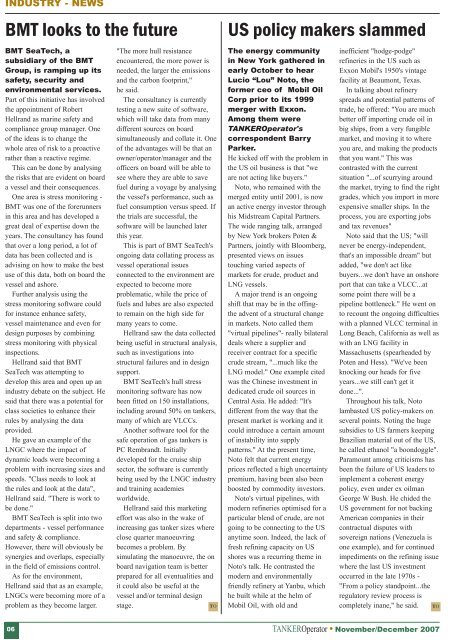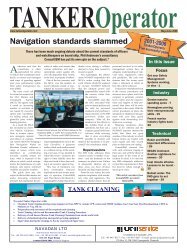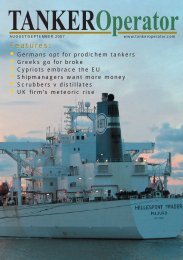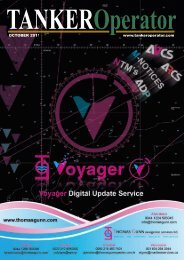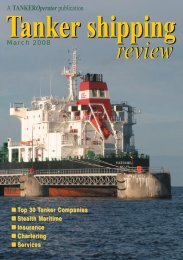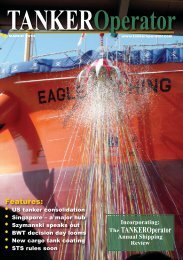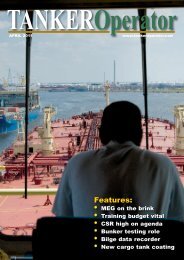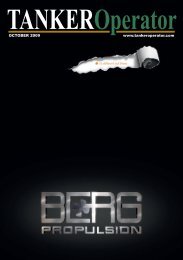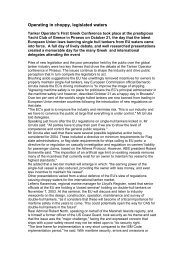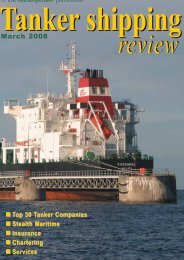Create successful ePaper yourself
Turn your PDF publications into a flip-book with our unique Google optimized e-Paper software.
INDUSTRY - NEWS<br />
BMT looks to the future<br />
BMT SeaTech, a<br />
subsidiary of the BMT<br />
Group, is ramping up its<br />
safety, security and<br />
environmental services.<br />
Part of this initiative has involved<br />
the appointment of Robert<br />
Hellrand as marine safety and<br />
compliance group manager. One<br />
of the ideas is to change the<br />
whole area of risk to a proactive<br />
rather than a reactive regime.<br />
This can be done by analysing<br />
the risks that are evident on board<br />
a vessel and their consequences.<br />
One area is stress monitoring -<br />
BMT was one of the forerunners<br />
in this area and has developed a<br />
great deal of expertise down the<br />
years. The consultancy has found<br />
that over a long period, a lot of<br />
data has been collected and is<br />
advising on how to make the best<br />
use of this data, both on board the<br />
vessel and ashore.<br />
Further analysis using the<br />
stress monitoring software could<br />
for instance enhance safety,<br />
vessel maintenance and even for<br />
design purposes by combining<br />
stress monitoring with physical<br />
inspections.<br />
Hellrand said that BMT<br />
SeaTech was attempting to<br />
develop this area and open up an<br />
industry debate on the subject. He<br />
said that there was a potential for<br />
class societies to enhance their<br />
rules by analysing the data<br />
provided.<br />
He gave an example of the<br />
LNGC where the impact of<br />
dynamic loads were becoming a<br />
problem with increasing sizes and<br />
speeds. "Class needs to look at<br />
the rules and look at the data",<br />
Hellrand said. "There is work to<br />
be done."<br />
BMT SeaTech is split into two<br />
departments - vessel performance<br />
and safety & compliance.<br />
However, there will obviously be<br />
synergies and overlaps, especially<br />
in the field of emissions control.<br />
As for the environment,<br />
Hellrand said that as an example,<br />
LNGCs were becoming more of a<br />
problem as they become larger.<br />
06<br />
"The more hull resistance<br />
encountered, the more power is<br />
needed, the larger the emissions<br />
and the carbon footprint,"<br />
he said.<br />
The consultancy is currently<br />
testing a new suite of software,<br />
which will take data from many<br />
different sources on board<br />
simultaneously and collate it. One<br />
of the advantages will be that an<br />
owner/operator/manager and the<br />
officers on board will be able to<br />
see where they are able to save<br />
fuel during a voyage by analysing<br />
the vessel's performance, such as<br />
fuel consumption versus speed. If<br />
the trials are successful, the<br />
software will be launched later<br />
this year.<br />
This is part of BMT SeaTech's<br />
ongoing data collating process as<br />
vessel operational issues<br />
connected to the environment are<br />
expected to become more<br />
problematic, while the price of<br />
fuels and lubes are also expected<br />
to remain on the high side for<br />
many years to come.<br />
Hellrand saw the data collected<br />
being useful in structural analysis,<br />
such as investigations into<br />
structural failures and in design<br />
support.<br />
BMT SeaTech's hull stress<br />
monitoring software has now<br />
been fitted on 150 installations,<br />
including around 50% on tankers,<br />
many of which are VLCCs.<br />
Another software tool for the<br />
safe operation of gas tankers is<br />
PC Rembrandt. Initially<br />
developed for the cruise ship<br />
sector, the software is currently<br />
being used by the LNGC industry<br />
and training academies<br />
worldwide.<br />
Hellrand said this marketing<br />
effort was also in the wake of<br />
increasing gas tanker sizes where<br />
close quarter manoeuvring<br />
becomes a problem. By<br />
simulating the manoeuvre, the on<br />
board navigation team is better<br />
prepared for all eventualities and<br />
it could also be useful at the<br />
vessel and/or terminal design<br />
stage.<br />
TO<br />
US policy makers slammed<br />
The energy community<br />
in New York gathered in<br />
early October to hear<br />
Lucio “Lou” Noto, the<br />
former ceo of Mobil Oil<br />
Corp prior to its 1999<br />
merger with Exxon.<br />
Among them were<br />
TANKER<strong>Operator</strong>'s<br />
correspondent Barry<br />
Parker.<br />
He kicked off with the problem in<br />
the US oil business is that "we<br />
are not acting like buyers."<br />
Noto, who remained with the<br />
merged entity until 2001, is now<br />
an active energy investor through<br />
his Midstream Capital Partners.<br />
The wide ranging talk, arranged<br />
by New York brokers Poten &<br />
Partners, jointly with Bloomberg,<br />
presented views on issues<br />
touching varied aspects of<br />
markets for crude, product and<br />
LNG vessels.<br />
A major trend is an ongoing<br />
shift that may be in the offingthe<br />
advent of a structural change<br />
in markets. Noto called them<br />
"virtual pipelines"- really bilateral<br />
deals where a supplier and<br />
receiver contract for a specific<br />
crude stream, "...much like the<br />
LNG model." One example cited<br />
was the Chinese investment in<br />
dedicated crude oil sources in<br />
Central Asia. He added: "It's<br />
different from the way that the<br />
present market is working and it<br />
could introduce a certain amount<br />
of instability into supply<br />
patterns." At the present time,<br />
Noto felt that current energy<br />
prices reflected a high uncertainty<br />
premium, having been also been<br />
boosted by commodity investors.<br />
Noto's virtual pipelines, with<br />
modern refineries optimised for a<br />
particular blend of crude, are not<br />
going to be connecting to the US<br />
anytime soon. Indeed, the lack of<br />
fresh refining capacity on US<br />
shores was a recurring theme in<br />
Noto's talk. He contrasted the<br />
modern and environmentally<br />
friendly refinery at Yanbu, which<br />
he built while at the helm of<br />
Mobil Oil, with old and<br />
inefficient "hodge-podge"<br />
refineries in the US such as<br />
Exxon Mobil's 1950's vintage<br />
facility at Beaumont, Texas.<br />
In talking about refinery<br />
spreads and potential patterns of<br />
trade, he offered: "You are much<br />
better off importing crude oil in<br />
big ships, from a very fungible<br />
market, and moving it to where<br />
you are, and making the products<br />
that you want." This was<br />
contrasted with the current<br />
situation "...of scurrying around<br />
the market, trying to find the right<br />
grades, which you import in more<br />
expensive smaller ships. In the<br />
process, you are exporting jobs<br />
and tax revenues"<br />
Noto said that the US; "will<br />
never be energy-independent,<br />
that's an impossible dream" but<br />
added, "we don't act like<br />
buyers...we don't have an onshore<br />
port that can take a VLCC...at<br />
some point there will be a<br />
pipeline bottleneck." He went on<br />
to recount the ongoing difficulties<br />
with a planned VLCC terminal in<br />
Long Beach, California as well as<br />
with an LNG facility in<br />
Massachusetts (spearheaded by<br />
Poten and Hess). "We've been<br />
knocking our heads for five<br />
years...we still can't get it<br />
done...".<br />
Throughout his talk, Noto<br />
lambasted US policy-makers on<br />
several points. Noting the huge<br />
subsidies to US farmers keeping<br />
Brazilian material out of the US,<br />
he called ethanol "a boondoggle".<br />
Paramount among criticisms has<br />
been the failure of US leaders to<br />
implement a coherent energy<br />
policy, even under ex oilman<br />
George W Bush. He chided the<br />
US government for not backing<br />
American companies in their<br />
contractual disputes with<br />
sovereign nations (Venezuela is<br />
one example), and for continued<br />
impediments on the refining issue<br />
where the last US investment<br />
occurred in the late 1970s -<br />
"From a policy standpoint...the<br />
regulatory review process is<br />
completely inane," he said. TO<br />
TANKER<strong>Operator</strong> � November/December 2007


